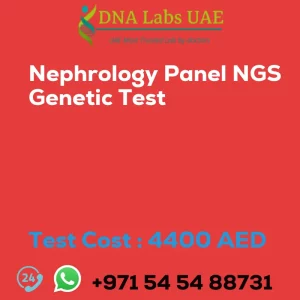ATP6V1B1 Gene Renal Tubular Acidosis with Deafness Genetic Test
Test Name: ATP6V1B1 Gene Renal Tubular Acidosis with Deafness Genetic Test
Components: ATP6V1B1 gene analysis
Price: 4400.0 AED
Sample Condition: Blood or Extracted DNA or One drop Blood on FTA Card
Report Delivery: 3 to 4 Weeks
Method: NGS Technology
Test Type: Hepatology, Nephrology, Endocrinology Disorders
Doctor: General Physician
Test Department: Genetics
Pre Test Information: Clinical History of Patient who is going for ATP6V1B1 Gene Renal Tubular Acidosis with Deafness NGS Genetic DNA Test. A Genetic Counselling session to draw a pedigree chart of family members affected with ATP6V1B1 Gene Renal Tubular Acidosis with Deafness NGS Genetic DNA Test gene ATP6V1B1
Test Details
The ATP6V1B1 gene is associated with a condition called renal tubular acidosis with deafness (RTA-Deafness). RTA is a disorder characterized by the inability of the kidneys to properly acidify urine, leading to a build-up of acid in the blood. This can result in various symptoms such as excessive thirst, frequent urination, dehydration, and electrolyte imbalances.
RTA-Deafness is a specific subtype of RTA that is caused by mutations in the ATP6V1B1 gene. This gene provides instructions for making a protein called V-ATPase B1 subunit, which is a component of the V-ATPase complex. This complex is responsible for maintaining the pH balance within cells and plays a crucial role in the acidification of urine in the kidneys.
Mutations in the ATP6V1B1 gene disrupt the normal function of the V-ATPase complex, leading to impaired acidification of urine and the development of RTA. In addition, these mutations can also affect the function of the inner ear, resulting in sensorineural hearing loss or deafness.
NGS (Next-Generation Sequencing) genetic testing is a type of genetic test that can analyze multiple genes simultaneously, allowing for the detection of mutations in the ATP6V1B1 gene and other genes associated with RTA-Deafness. This test involves sequencing the DNA of an individual to identify any genetic variants or mutations that may be contributing to their symptoms.
By identifying mutations in the ATP6V1B1 gene through NGS genetic testing, healthcare professionals can confirm a diagnosis of RTA-Deafness and provide appropriate management and treatment options for affected individuals.
| Test Name | ATP6V1B1 Gene Renal tubular acidosis with deafness Genetic Test |
|---|---|
| Components | |
| Price | 4400.0 AED |
| Sample Condition | Blood or Extracted DNA or One drop Blood on FTA Card |
| Report Delivery | 3 to 4 Weeks |
| Method | NGS Technology |
| Test type | Hepatology Nephrology Endocrinology Disorders |
| Doctor | General Physician |
| Test Department: | Genetics |
| Pre Test Information | Clinical History of Patient who is going for ATP6V1B1 Gene Renal tubular acidosis with deafness NGS Genetic DNA Test. A Genetic Counselling session to draw a pedigree chart of family members affected with ATP6V1B1 Gene Renal tubular acidosis with deafness NGS Genetic DNA Test gene ATP6V1B1 |
| Test Details | The ATP6V1B1 gene is associated with a condition called renal tubular acidosis with deafness (RTA-Deafness). RTA is a disorder characterized by the inability of the kidneys to properly acidify urine, leading to a build-up of acid in the blood. This can result in various symptoms such as excessive thirst, frequent urination, dehydration, and electrolyte imbalances. RTA-Deafness is a specific subtype of RTA that is caused by mutations in the ATP6V1B1 gene. This gene provides instructions for making a protein called V-ATPase B1 subunit, which is a component of the V-ATPase complex. This complex is responsible for maintaining the pH balance within cells and plays a crucial role in the acidification of urine in the kidneys. Mutations in the ATP6V1B1 gene disrupt the normal function of the V-ATPase complex, leading to impaired acidification of urine and the development of RTA. In addition, these mutations can also affect the function of the inner ear, resulting in sensorineural hearing loss or deafness. NGS (Next-Generation Sequencing) genetic testing is a type of genetic test that can analyze multiple genes simultaneously, allowing for the detection of mutations in the ATP6V1B1 gene and other genes associated with RTA-Deafness. This test involves sequencing the DNA of an individual to identify any genetic variants or mutations that may be contributing to their symptoms. By identifying mutations in the ATP6V1B1 gene through NGS genetic testing, healthcare professionals can confirm a diagnosis of RTA-Deafness and provide appropriate management and treatment options for affected individuals. |







